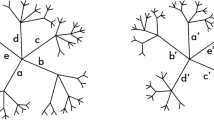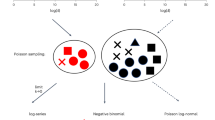Abstract
IT is often proposed by taxonomists and ecologists that classifications and other related analyses should be based on the possible largest number of characters. They believe that when large character sets are used the analysis will gain in accuracy, and the results will be more broadly applicable. Yet sampling, computational and other logistic problems are often associated with the handling of large character sets. Some characters may have to be deleted in the interest of more economical sampling and computations.
This is a preview of subscription content, access via your institution
Access options
Subscribe to this journal
Receive 51 print issues and online access
$199.00 per year
only $3.90 per issue
Buy this article
- Purchase on Springer Link
- Instant access to full article PDF
Prices may be subject to local taxes which are calculated during checkout
Similar content being viewed by others
References
Ward, J. H., J. Am. Statist. Ass., 58, 236 (1963).
Orloci, L., Handbook of Vegetation Science (edit. by Tüxen, R.), 5 (Junk, The Hague, 1972).
Williams, W. T., and Lambert, J. M., J. Ecol., 47, 83 (1959).
Author information
Authors and Affiliations
Rights and permissions
About this article
Cite this article
ORLOCI, L. Ranking Characters by a Dispersion Criterion. Nature 244, 371–373 (1973). https://doi.org/10.1038/244371a0
Received:
Revised:
Issue Date:
DOI: https://doi.org/10.1038/244371a0
This article is cited by
-
A numerical phytoclimatic classification of China
International Journal of Biometeorology (1991)
-
Phytoecological importance, mutual redundancy and phytological threshold values of certain climatic factors
Vegetatio (1990)
-
Software abstract
Journal of Classification (1989)
-
Species selection by interactive ranking
Vegetatio (1984)
Comments
By submitting a comment you agree to abide by our Terms and Community Guidelines. If you find something abusive or that does not comply with our terms or guidelines please flag it as inappropriate.



